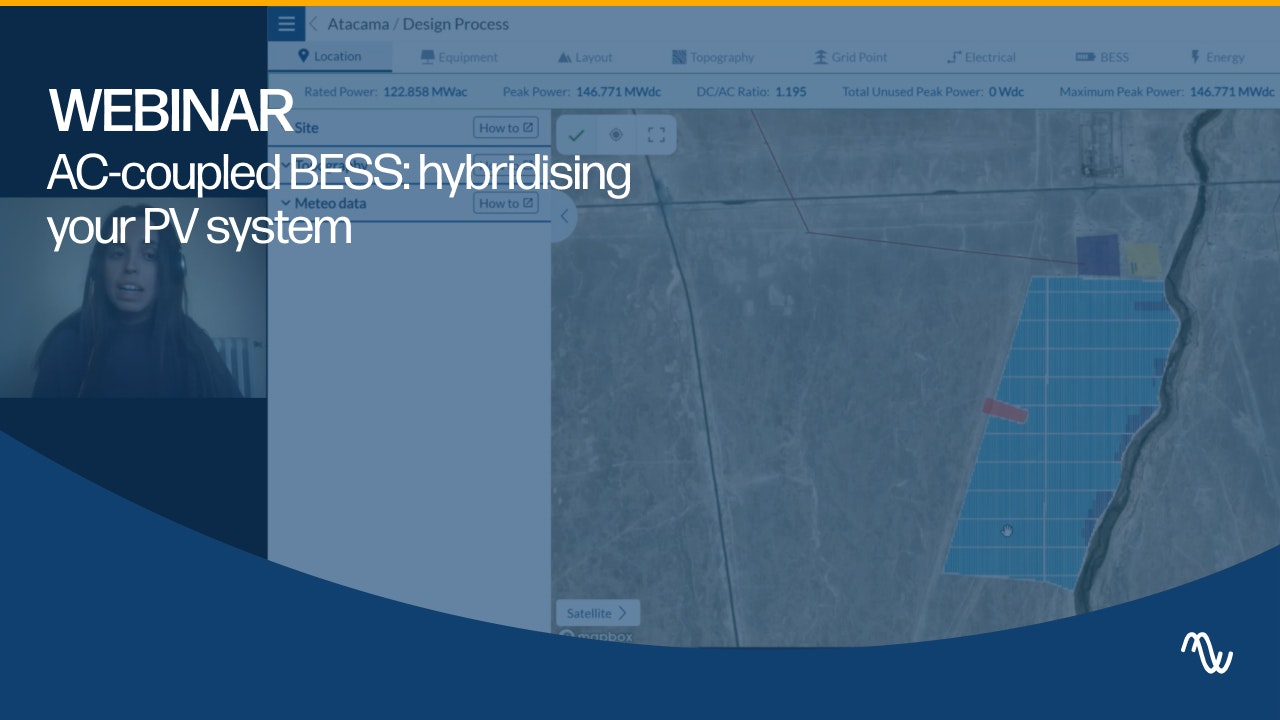- Solar energy blog
- AC vs DC-coupled BESS: the pros and cons
AC vs DC-coupled BESS: the pros and cons


Natalia Opie
Manager of Customer Success
Natalia Opie leads the Customer Success team for RatedPower. She is passionate for renewable energies and their role within the global environmental transition and has a thorough understanding of the solar industry, backed by her BSc in Energy Engineering, her MSc in Renewable Energy in Electrical Systems, and six years of experience partnering with clients of different countries to develop profitable, optimized assets.
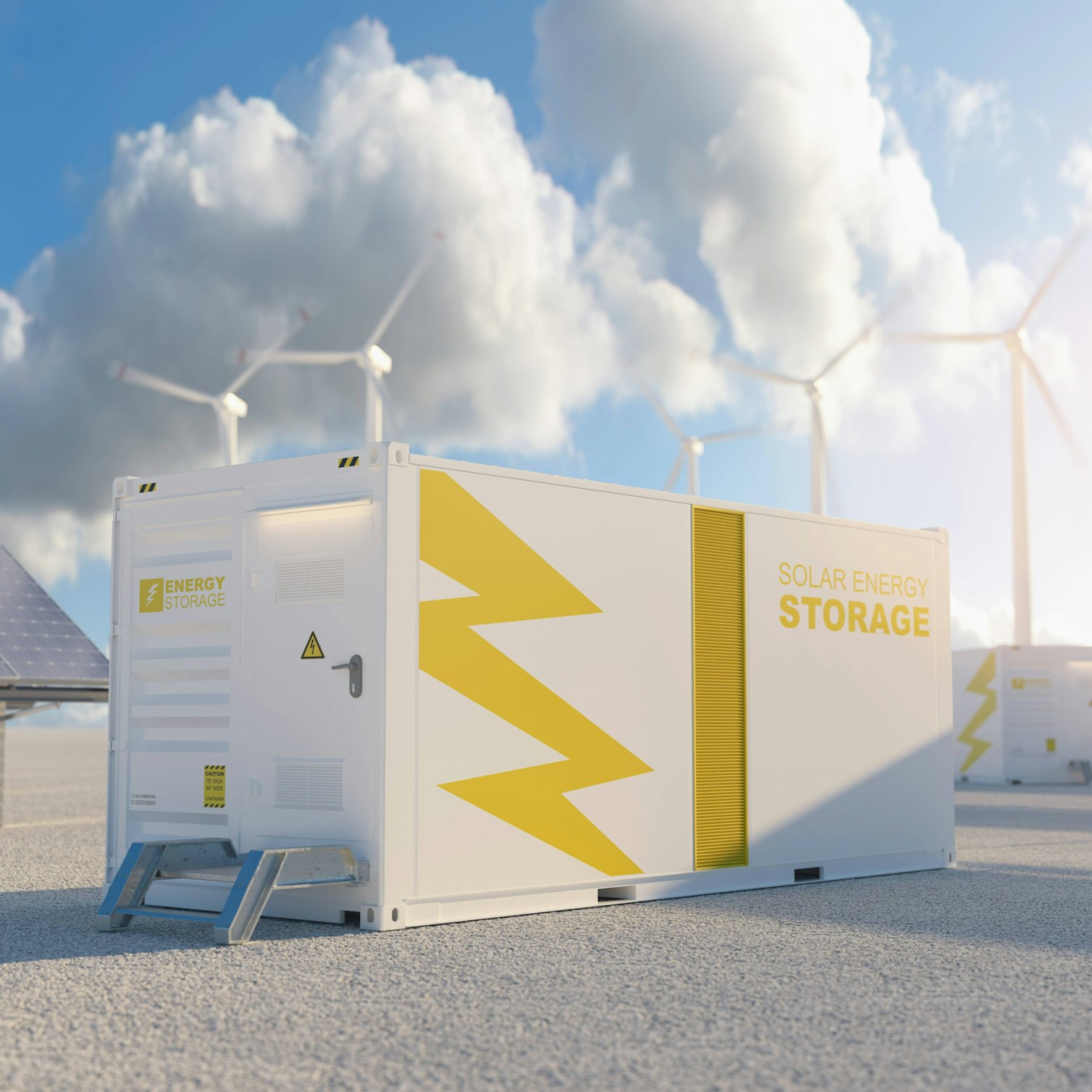
Content
- What are AC-coupled systems?
- What are DC-coupled systems?
- What are the advantages of AC-coupled battery systems?
- What are the disadvantages of AC-coupled battery systems?
- What are the advantages of a DC-coupled system?
- What are the disadvantages of a DC-coupled system?
- Should I use an AC- or DC-coupled system for my solar plant?
- RatedPower platform ensure the efficiency of your plant
Solar panels can be coupled, or linked, to a battery either through alternating current (AC) coupling or direct current (DC) coupling. AC current flows rapidly on electricity grids both forward and backward. DC current, on the other hand, flows only in one direction.
DC current is what is generated by solar panels and stored by batteries, but because appliances use AC current (just look at the AC circuit board you have in your home) the current must be converted via inverters.
In the past, AC-coupled BESSs were most often used with residential and commercial solar installations, and DC-coupled systems were used for remote and off-grid installations, but more options for DC-coupled systems have become available. Equipment manufacturers are developing streamlined and standardized power electronics equipment for DC-coupled BESSs.
Over the past decade, inverter technology has advanced and resulted in the development of new AC-coupled and DC-coupled systems. Let’s find out more.
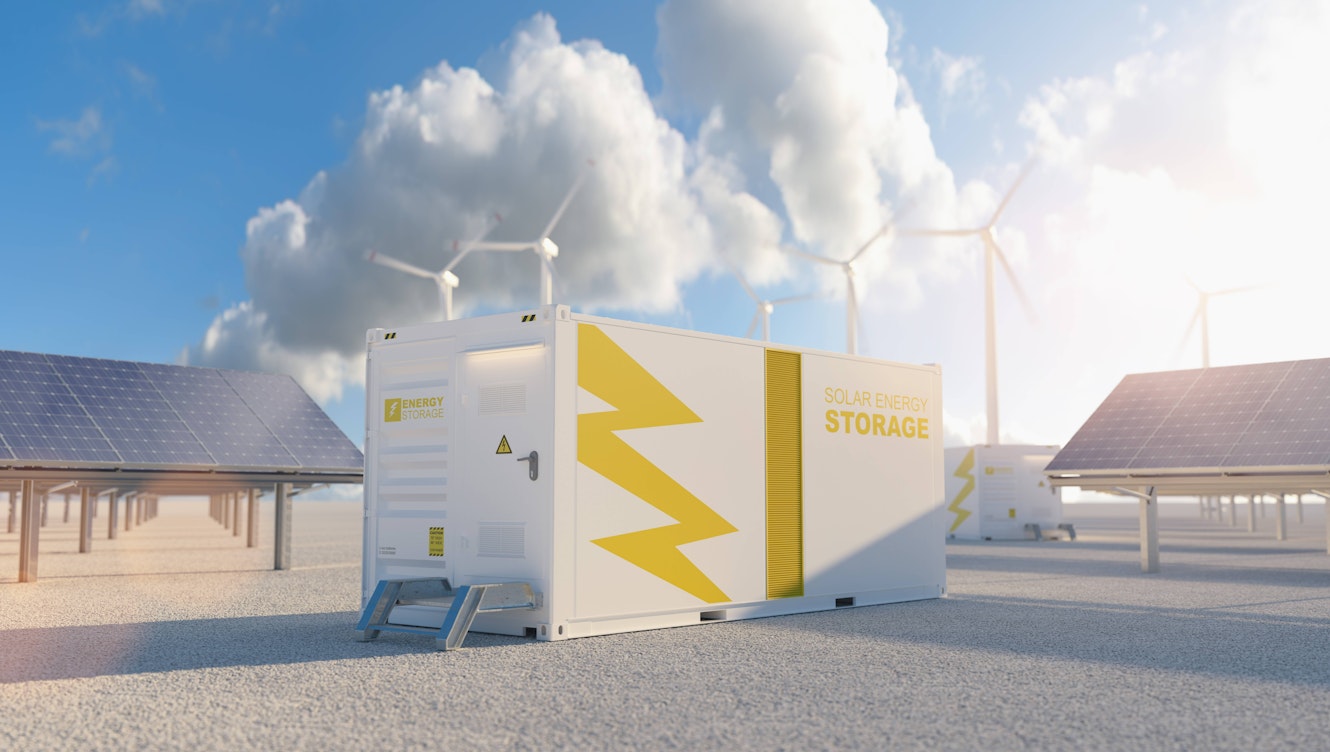
What are AC-coupled systems?
In AC-coupled systems, there are separate inverters for the solar panels and the battery. Both the solar panels and the battery module can be discharged at full power and they can either be dispatched together or independently, creating flexibility in how the system operates. The solar panels and battery can either share an interconnection to the grid or run on separate interconnections.
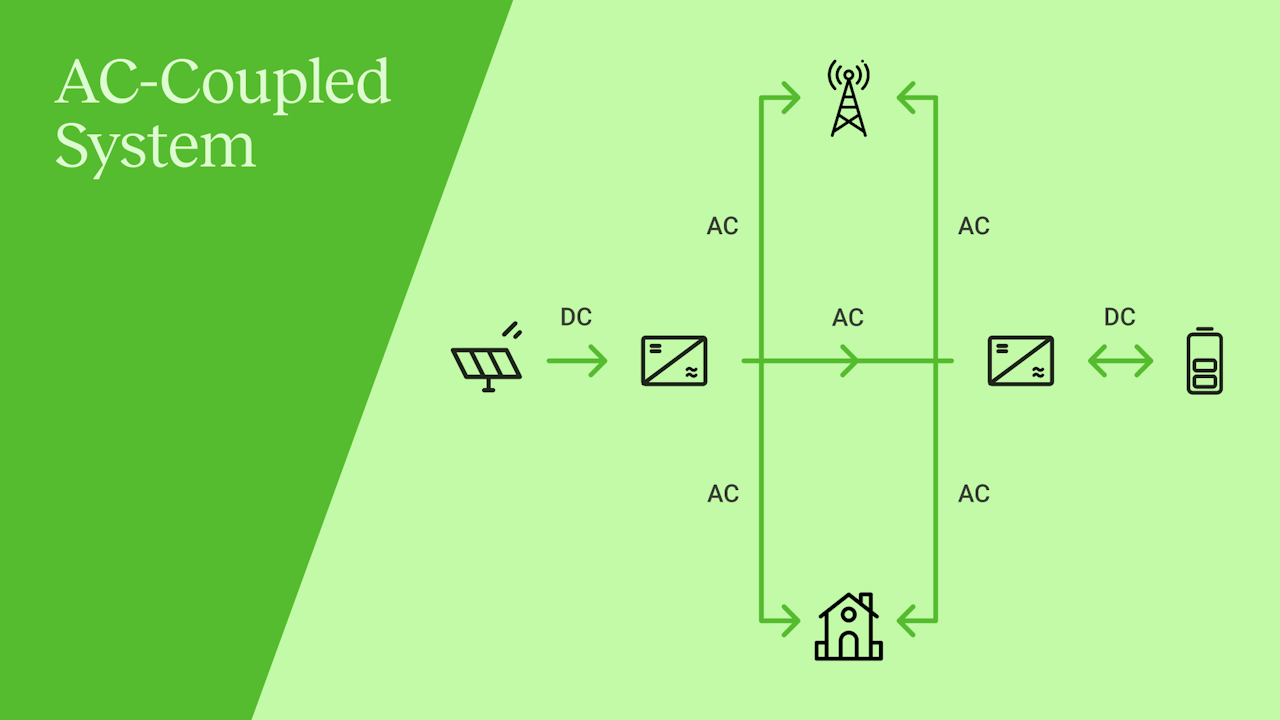
AC-coupled battery energy storage system diagram. Source: RatedPower
AC BESSs comprise a lithium-ion battery module, inverters/chargers, and a battery management system (BMS). These compact units are easy to install and a popular choice for upgrading energy systems and the systems are used for grid-connected sites as the inverters tend not to be powerful enough to run off-grid.
It’s worth noting that because both the solar panel and the battery are DC-current compatible, the current will need to be converted three times in an AC-coupled system.
What are DC-coupled systems?
DC-coupled systems typically use solar charge controllers, or regulators, to charge the battery from the solar panels, along with a battery inverter to convert the electricity flow to AC.
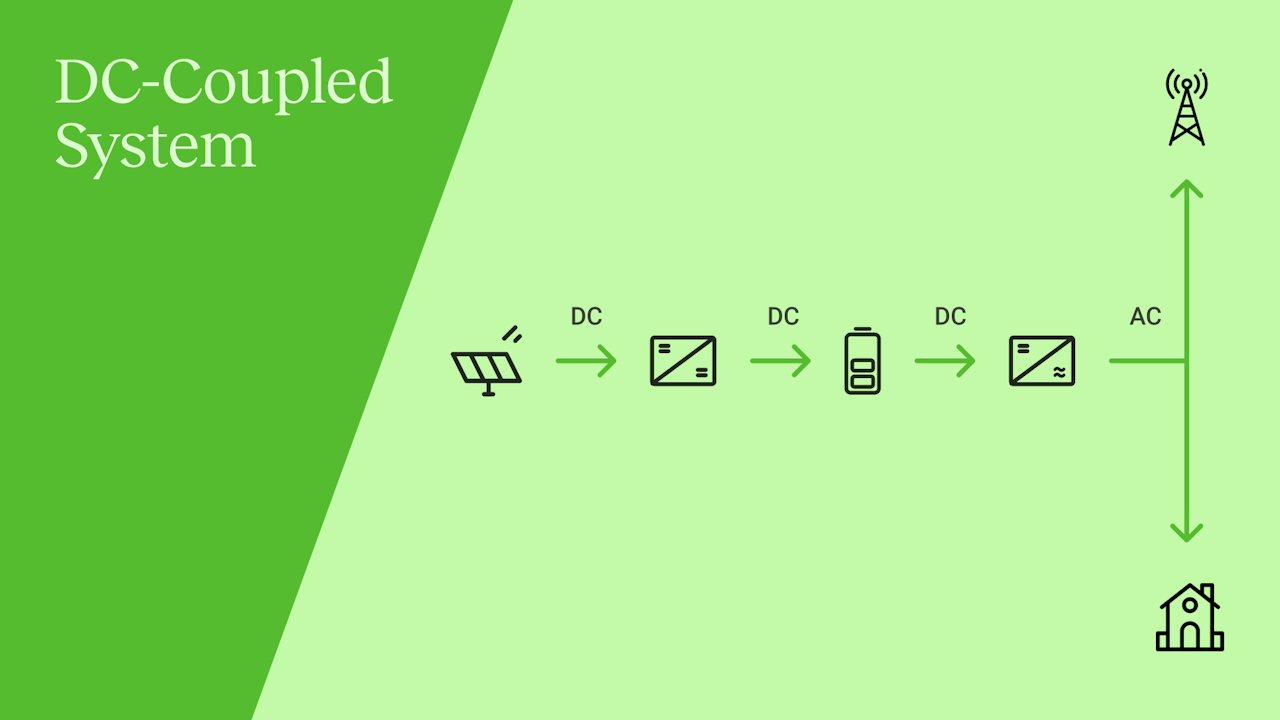
DC-coupled battery energy storage system. Source: RatedPower
The solar panels and battery module use the same inverter and share the grid interconnection, reducing the cost of equipment. This also reduces power losses from inverting the current and running separate interconnection lines to the grid, as the solar array and battery are dispatched as a single facility. But this offers less flexibility than an AC system.
What are the advantages of AC-coupled battery systems?
There are several benefits to using an AC-coupled BESS for your solar plant, including:
Retrofitting: AC-coupled batteries are easy to install on an existing solar panel system, and more can be added to expand capacity.
Flexibility: Installers are not restricted in where the inverters and batteries can be located. AC coupling works with any type of inverter.
Resiliency: The flexibility to install multiple inverters and batteries in different locations helps risk of an outage if an inverter fails. Having multiple inverters provides more combined power and battery faults do not have an impact on power generation.
Versatility: AC-coupled systems enable batteries to charge from the grid as well as the solar panels and the grid, so if the solar panels are not generating enough electricity, the battery can still charge from the grid.
What are the disadvantages of AC-coupled battery systems?
Cost: AC-coupled systems cost more than DC-coupled systems as they use multiple inverters.
Lower efficiency: The stored energy is converted three times, from the DC current to AC current to supply the building and then back to DC current to the battery and again back into AC. Each conversion results in a small amount of energy loss.
Supply limitations: AC BESSs are not designed to be used off-grid and as they are transformerless, they cannot manage the surge loads from multiple appliances.
What are the advantages of a DC-coupled system?
Where AC-coupled systems suffer in terms of efficiency and cost, DC-coupled systems have the advantage:
Affordability: DC-coupled systems tend to be cheaper than AC-coupled systems as the solar panels and battery use a single inverter and less extra equipment such as voltage transformers and switchgear.
Higher efficiency: Unlike AC systems which convert the current multiple times, DC BESSs only convert the current once, reducing energy losses and making them more efficient.
Oversizing: DC-coupled systems allow solar panels to generate more electricity than the inverter rating. The excess energy can be used to charge the battery, an EV charger or a water heating system, whereas in an AC-coupled system the energy is lost.
What are the disadvantages of a DC-coupled system?
Limited flexibility: Installers have less flexibility than with an AC system, as the inverter needs to be located close to the battery.
Less resiliency: With a single inverter in a DC-coupled system, if the inverter fails, the solar power as well as the battery capacity is lost.
Should I use an AC- or DC-coupled system for my solar plant?
AC-coupled systems are the preferred option for larger and utility-scale plants. That’s because while AC-coupled systems are slightly less efficient at charging batteries (90-94% vs 98% achieved by DC-coupled), they are far easier to install, especially into an existing system.
That said, whether AC-coupled or DC-coupled is the best solution for your PV plant design will be project specific. You can use a PV plant software solution to run several simulations and identify the best option.
Interested in learning how to hybridize your PV systems? Check out this webinar and get all the insights on AC-coupled BESS.
RatedPower platform ensure the efficiency of your plant
RatedPower platform is designed to optimize and automate the design process, helping you weigh up the options between AC- and DC-coupled BESS. Contact us to find out how RatedPower can increase your project’s efficiency and profit margins.
2025 Trends: Renewable Energy & Solar Research Report
Get key insights and data from an industry-wide survey and solar simulations on the RatedPower platform. Download now to uncover critical trends and challenges shaping the future of renewables.

Latest stories
Related posts
Technology and engineering
Outsmarting congestion: How efficient solar design helps navigate Nordic grid limits
Learn how Nordic operators and solar developers are adjusting to tighter grid conditions and how policy and design decisions are keeping projects on track.
Updated 16 DEC, 25

Technology and engineering
The rise of ultra-thin perovskite solar cells
Learn about Japan’s $1.5B initiative to commercialize ultra-thin, flexible perovskite solar cells and how it could transform the solar landscape globally.
Updated 30 SEP, 25

Technology and engineering
The green hydrogen boom in LatAm
Latin America is emerging as a green hydrogen leader. Learn how LatAm countries are leveraging solar and wind power to drive green hydrogen production.
Updated 22 JUL, 25
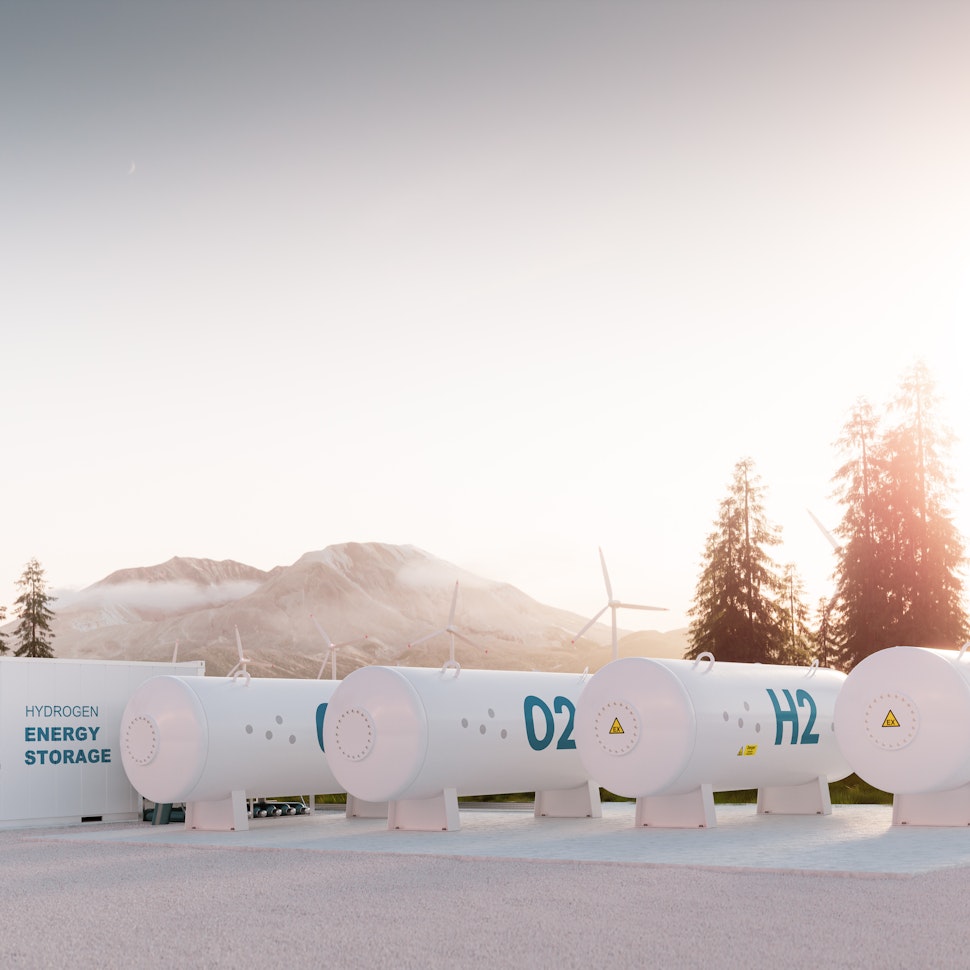
- RatedPower
- Solar energy blog
- AC vs DC-coupled BESS: the pros and cons
 Watch a demo
Watch a demo